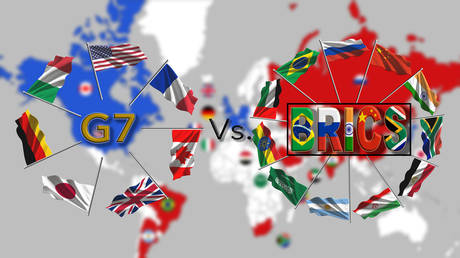
BRICS overtaking G7 in economic might – Bloomberg
The group’s share of global GDP in PPP terms is set to more than double that of the G7 by 2040, according to a report
The rapid rise of the BRICS is transforming the global economy, with the group’s share of world GDP in terms of purchasing power parity (PPP) set to rise well beyond of that of the Group of Seven (G7) major advanced economies, Bloomberg reported this week.
BRICS currently comprises Brazil, Russia, India, China, and South Africa, but the group will be joined in January by Argentina, Egypt, Ethiopia, Iran, Saudi Arabia, and the UAE.
The G7 club of industrialized and developed countries consists of the US, Canada, the UK, France, Italy, Germany, and Japan.
The report indicated that the expanded BRICS are already larger than the G7. In 2022 the bloc accounted for 36% of the global economy, versus 30% for the advanced economy group.
“Our forecasts suggest an expanding workforce and ample room for technological catch-up will boost the BRICS+ share to 45% by 2040, compared with 21% for G7 economies. In effect, BRICS+ and the G7 will have swapped places in relative size between 2001 and 2040,” Bloomberg wrote.
Read more
BRICS trade surges ahead of enlargement – Bloomberg
The outlet also pointed out that the expanded BRICS economic group will contain some of the world’s largest oil exporters, namely Saudi Arabia, Russia, UAE and Iran, as well as some of its biggest importers – China and India.
“If it [BRICS] succeeds in shifting some settlement of oil transactions toward other currencies, that could have a knock-on effect on the share of the dollar in international trade and global foreign exchange reserves,” the report added, noting that the BRICS members have been working actively to abandon the greenback in their trade.
While highlighting the advantages of BRICS, such as its size, diversity and ambition, the report also pointed out some of the challenges facing the group, including China’s economic slowdown, the inability to shift away from the petrodollar in the near future, as well as a ‘reluctance’ to promote a single alternative.
“The BRICS will change the world, but perhaps more because of their rising share of GDP and divergent political and economic systems than through the realization of policymakers’ grand plans,” Bloomberg concluded.
For more stories on economy & finance visit RT’s business section

